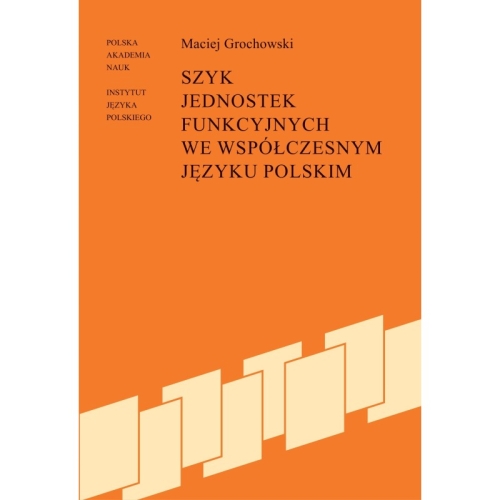
A Panorama of Polish Word-Formation
Bogdan Szymanek
Page(s): 326
Section: językoznawstwo
ISBN: 9788380610941
|
|
|
|---|---|
Książka pt. A Panorama of Polish Word-Formation to studium opisowe systemu słowotwórczego współczesnej polszczyzny. Książka - napisana w języku angielskim - przeznaczona jest dla szerokiego kręgu czytelników anglojęzycznych: językoznawców (w szczególności slawistów i morfologów), a także osób uczących się języka polskiego jako obcego. Praca ma charakter podręcznikowy. Przedstawia m.in. produktywne procesy i kategorie derywacyjne polszczyzny, scharakteryzowane w aspekcie formalnym i funkcjonalnym. Ogólne zagadnienia i problemy teoretyczne morfologii, przenikające całość analizowanego materiału, wysuwają się na pierwszy plan w ostatnim rozdziale, adresowanym do odbiorcy o wyższym poziomie przygotowania merytorycznego. Bogaty materiał ilustracyjny (słownikowy) wykorzystany w pracy zebrano w "Indeksie polskich wyrazów" na końcu książki. Obszerny spis cytowanej literatury zaznajomi czytelnika z najważniejszymi publikacjami polskich językoznawców w dziedzinie morfologii derywacyjnej.
Contents
Abbreviations and Symbols
Preface and Acknowledgements
1. PRELIMINARIES
1.1. Introduction
1.2. A note on citation forms and representations
1.3. Vocabulary sources
1.4. Formal types of morphological processes
1.5. Data classification and categorization
2. DERIVATION
2.1. Introduction
2.2. Derived nouns
2.2.1. Introduction
2.2.2. Abstract deverbal nominalizations
2.2.3. Abstract de-adjectival nominalizations
2.2.4. Agentive nominalizations
2.2.5. Instrumental nominalizations
2.2.6. Personal patientive nominalizations
2.2.7. Obiective/Resultative nominalizations
2.2.8. Locative nouns
2.2.9. Collective nouns
2.2.10. Attributive nouns
2.2.11. Female nouns
2.2.12. Ethnic names and names of inhabitants
2.3. Derived adjectives
2.3.1. Introduction
2.3.2. Denominal adjectives
2.3.2.1. Major functions of relational adjectives
2.3.2.2. Major functions of qualitative adjectives
2.3.3. Deverbal adjectives
2.3.3.1. Subjectvs objectadjectivizations
2.3.3.2. Adjectives of tendency and inclination (subjective)
2.3.3.3. Passive adjectives of possibility (objective)
2.3.4. De-adjectival adjectives
2.3.4.1. Negative and privative adjectives
2.3.4.2. Adjectives of gradation
2.3.4.2.1. Relative gradation; adjectival comparison
2.3.4.2.2. Absolute gradation: intensifying and attenuative adjectives
2.4. Derived verbs
2.4.1. Introduction: a note on aspect
2.4.2. De verbal verbs
2.4.2.1. Prefix do-
2.4.2.2. Prefix na-
2.4.2.3. Prefix nad(e)-
2.4.2.4. Prefix o-/ob(e)-
2.4.2.5. Prefix od(e)-
2.4.2.6. Prefix po-
2.4.2.7. Prefix pod(e)-
2.4.2.8. Prefix prze-
2.4.2.9. Prefix przy-
2.4.2.10. Prefix roz(e)-
2.4.2.11. Prefix u-
2.4.2.12. Prefix w(e)-
2.4.2.13. Prefix wy-
2.4.2.14. Prefix z(e)-/s-/ś-
2.4.2.15. Prefix za-
2.4.3. De-adjectival verbs
2.4.4. Denominal verbs
2.5. Derived adverbs
2.5.1. Introduction
2.5.2. Scope of the process
2.5.3. Distribution of the rival adverb-forming suffixes -o and -e
2.6. Expressive and evaluative derivation
2.6.1. Introduction
2.6.2. Diminutives and hypocoristics
2.6.3. Augmentatives and depreciatives
2.6.4. Expressive adjectives and adverbs: intensification
3. COMPOUNDING
3.1. Introduction
3.2. Compound nouns
3.3. Compound adjectives
4. PUZZLES AND PROBLEMS
4.1. Introduction
4.2. Paradigmatic derivation
4.3. Derivation from phrasal bases
4.3.1. Introduction
4.3.2. Adjectives from prepositional phrases
4.3.3. Nouns from prepositional phrases
4.3.4. 'Univerbation' (morphological condensation)
4.3.5. Bracketing paradoxes
4.3.6. Discussion
4.4. Double (multiple) motivation
4.5. The concept of the intermorph
4.6. Double diminutives
4.7. Derivational homonyms
References
Index of Polish words











Bogdan Szymanek
Wydawnictwo KUL, 2015
Section: językoznawstwo
Page(s): 326
ISBN: 9788380610941